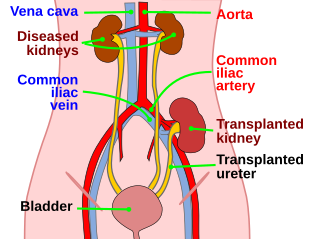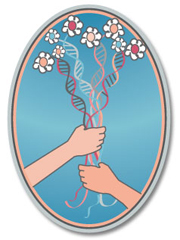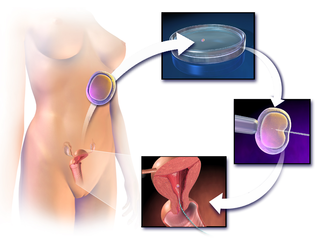
In vitro fertilisation (IVF) is a process of fertilisation in which an egg is combined with sperm in vitro. The process involves monitoring and stimulating a woman's ovulatory process, then removing an ovum or ova from her ovaries and enabling a man's sperm to fertilise them in a culture medium in a laboratory. After a fertilised egg (zygote) undergoes embryo culture for 2–6 days, it is transferred by catheter into the uterus, with the intention of establishing a successful pregnancy.

A father is the male parent of a child. Besides the paternal bonds of a father to his children, the father may have a parental, legal, and social relationship with the child that carries with it certain rights and obligations. A biological father is the male genetic contributor to the creation of the infant, through sexual intercourse or sperm donation. A biological father may have legal obligations to a child not raised by him, such as an obligation of monetary support. An adoptive father is a man who has become the child's parent through the legal process of adoption. A putative father is a man whose biological relationship to a child is alleged but has not been established. A stepfather is a non-biological male parent married to a child's preexisting parent and may form a family unit but generally does not have the legal rights and responsibilities of a parent in relation to the child.
Embryo donation is one disposition option for users of in vitro fertilisation with remaining fresh or frozen embryos. It is defined as the giving—generally without compensation—of embryos remaining after in vitro fertilization procedures to recipients for procreative implantation or research. Most IVF users with supernumerary embryos make embryo donation decisions after completing their families or discontinuing use of in vitro fertilization. Recipients of embryos donated for procreative implantation typically plan to transfer fresh or frozen embryos into a prepared uterus in order to facilitate pregnancy and childbirth. Recipients of embryos donated for research typically use them for clinical training, quality improvement research, or human embryonic stem cell research.

Kidney transplant or renal transplant is the organ transplant of a kidney into a patient with end-stage kidney disease (ESRD). Kidney transplant is typically classified as deceased-donor or living-donor transplantation depending on the source of the donor organ. Living-donor kidney transplants are further characterized as genetically related (living-related) or non-related (living-unrelated) transplants, depending on whether a biological relationship exists between the donor and recipient. The first successful kidney transplant was performed in 1954 by a team including Joseph Murray, the recipient's surgeon, and Hartwell Harrison, surgeon for the donor. Murray was awarded a Nobel Prize in Physiology or Medicine in 1990 for this and other work. In 2018, an estimated 95,479 kidney transplants were performed worldwide, 36% of which came from living donors.

A sperm bank, semen bank, or cryobank is a facility or enterprise which purchases, stores and sells human semen. The semen is produced and sold by men who are known as sperm donors. The sperm is purchased by or for other persons for the purpose of achieving a pregnancy or pregnancies other than by a sexual partner. Sperm sold by a sperm donor is known as donor sperm.
A donor offspring, or donor conceived person, is conceived via the donation of sperm or ova, or both.

A biobank is a type of biorepository that stores biological samples for use in research. Biobanks have become an important resource in medical research, supporting many types of contemporary research like genomics and personalized medicine.

The Donor Sibling Registry is a website and non-profit US organization serving donor offspring, sperm donors, egg donors and other donor conceived people. It was founded in September 2000 by a mother-and-son team, Wendy Kramer and Ryan Kramer of Nederland, Colorado.
Organ trade is the trading of human organs, tissues, or other body products, usually for transplantation. According to the World Health Organization (WHO), organ trade is a commercial transplantation where there is a profit, or transplantations that occur outside of national medical systems. There is a global need or demand for healthy body parts for transplantation, which exceeds the numbers available.
Sperm donation is the provision by a man of his sperm with the intention that it be used in the artificial insemination or other "fertility treatment" of one or more women who are not his sexual partners in order that they may become pregnant by him. Where pregnancies go to full term, the sperm donor will be the biological father of every baby born from his donations. The man is known as a sperm donor and the sperm he provides is known as "donor sperm" because the intention is that the man will give up all legal rights to any child produced from his sperm, and will not be the legal father. Sperm donation may also be known as "semen donation".

The Kids Are All Right is a 2010 American comedy drama film directed by Lisa Cholodenko and written by Cholodenko and Stuart Blumberg. It is among the first mainstream movies to show a same-sex couple raising two teenagers. A hit at the 2010 Sundance Film Festival, it opened in limited release on July 9, 2010, expanded to more theaters on July 30, 2010, and was released on DVD and Blu-ray on November 16, 2010. The film was awarded the Golden Globe Award for Best Motion Picture – Musical or Comedy and Annette Bening was awarded the Golden Globe Award for Best Actress – Motion Picture Musical or Comedy. The film also received four Academy Award nominations, including Best Picture, at the 83rd Academy Awards. As of 2024, it is the last film Cholodenko has directed.

GoFundMe is an American for-profit crowdfunding platform that allows people to raise money for events ranging from life events such as celebrations and graduations to challenging circumstances like accidents and illnesses. From 2010 to the beginning of 2020, over $9 billion has been raised on the platform, with contributions from over 120 million donors.
LGBT parents in Canada have undergone significant progress in terms of both legal and social acceptance. Same-sex couples who wish for parenthood now enjoy equally the possibilities, responsibilities and rights of opposite-sex couples. Following the nationwide legalization of same-sex marriage in 2005, the number of LGBT families in Canada has increased substantially, paving the way for same-sex couples' aspirations of having their own children. Legal methods of assisted reproduction range from insemination via IVF through to surrogacy arrangements.
Organ transplantation is a common theme in science fiction and horror fiction, appearing as early as 1925, in Russian short story Professor Dowell's Head. It may be used as a device to examine identity, power and loss of power, current medical systems; explore themes of bodily autonomy; or simply as a vehicle for body horror or other fantastical plots. Organ transplantation in fiction is often used as horror and something that harms the people involved, in contrast to how organ donation is presented in real life, as something hopefully good for those involved.

Millie Bobby Brown Bongiovi is a British actress. She gained recognition for playing Eleven in the Netflix science fiction series Stranger Things (2016–present), for which she received nominations for two Primetime Emmy Awards. Brown has starred in the monster film Godzilla: King of the Monsters (2019) and its sequel Godzilla vs. Kong (2021). She also starred in and produced the Netflix films Enola Holmes (2020), Enola Holmes 2 (2022), and Damsel (2024).
Jordan Sebastian Waller is a British actor and writer, known for playing Lord Alfred Paget in the television series Victoria.
A dibling, a portmanteau of donor sibling, or donor-conceived sibling, or donor-sperm sibling, is one of two or more individuals who are biologically connected through donated eggs or sperm. This term is also commonly used in children biologically related through embryo donation. In tis instance, the children are full not half biological siblings. The term is not favored among some recipient parents, who prefer the use of half-sibling.
Abigail Marsh is an American psychologist and neuroscientist who works as a professor at Georgetown University's Department of Psychology and the Interdisciplinary Neuroscience Program, where she is the director of the Laboratory on Social and Affective Neuroscience.

Lesbian, gay, bisexual, and transgender people people wishing to have children may use assisted reproductive technology. In recent decades, developmental biologists have been researching and developing techniques to facilitate same-sex reproduction.

Fertility fraud is the failure on the part of a fertility doctor to obtain consent from a patient before inseminating her with his own sperm. This normally occurs in the context of people using assisted reproductive technology (ART) to address fertility issues.










